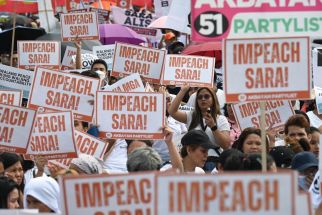Annus horribilis?
January 28, 2006 | 12:00am
Those who think that 2005 was such a year for the country will find some support in the newly-issued Social Weather Stations 2006 Annual Survey Review. The Review will not endear SWS president Mahar Mangahas to Malacañang, whose "communications" machine has been trying mightily to convince the public that things are looking up for the country, and that we are on the verge of economic "take-off" and political redemption. Not that Mahar, or SWS, particularly cares.
It was "a year of great trials," the influential SWS concluded, as it presented a summary of quarterly national surveys in the areas of economic well-being, public safety, governance, national security, foreign relations, corruption, the political crisis, and public morale and equanimity.
The "Summary" slide in Mahar’s presentation said it all in telegraphic language: Economic well-being: Quite bad, ignore GNP. Public Safety: Crime trend may be upwards. Governance: Public satisfaction at historical low. National security: Fear of terrorism is high. Foreign relations: Enthusiasm about US is down. Corruption: The Coalition Against Corruption looks sustainable. Political crisis: "Hello Garci" not over; Chacha iffy. Public morale and equanimity: Dented but indestructible.
Alarmed government spinmeisters might immediately note that SWS surveys measure perceptions and do not track government statistics which may tell an entirely different story. In the area of economic well-being, for example, to counter such SWS findings as "Hunger went from record low in September 03 to record high in Dec 05," our economic managers tend to trot out statistics on growth in the gross national product, the number of jobs created, a reported reduction in national poverty, even the improvement in the peso vs. dollar exchange rate and an increase in foreign investment.
But, as SWS correctly notes, even allowing for comments such as that of an economic planning official who allegedly argued that people tend to overstate their pessimism and understate their optimism, we can’t ignore how people rate their own experience. While government statistics may not be inaccurate, they are to a great extent misleading because they don’t reflect what ordinary people, especially the poor, are feeling on the ground.
At the very least, unfavorable perceptions confirm that reported growth in the GNP and other "good news" on the national economic front do not do enough to relieve the increasing economic pressure the people feel. While consumer spending might strike some analysts as evidence that people have more money in their pockets, that may be true only of some people, or the people who had more money to begin with, not those in economic strata where three meals a day, a roof over the family’s heads, clothing, education, and health care are a daily struggle.
The SWS finding that may devastate the incumbent administration is that it wasn’t always this way. The picture was much better in this government’s early days, an achievement which was faithfully reported by SWS too. But for whatever reason – and that’s another matter for vigorous debate, especially for those who find evil politics lurking behind every national problem – the situation has deteriorated markedly.
The SWS findings in matters of governance and the current political crisis are even more alarming. Realistically however, politicians in power seem to regard bad news like this as little more than another "problem area" which can be assigned to "experts" for study and submission of volumes of recommended "action plans," at great additional expense to the Treasury, naturally.
At any rate, SWS found that "net satisfaction with a President has never been so low and prolonged," and reported a record low dissatisfaction rating for her. In addition, the survey also indicated dissatisfaction with the government’s performance in fighting inflation, corruption and crime.
The surveys also said that the political crisis which stemmed from a controversial election isn’t over. GMA’s people won’t be happy that 57 percent believe GMA told a Commission on Elections official to cheat, 79 percent favored impeachment but "few" trusted the House and the Senate to be fair in their decisions, and 64 percent favored GMA’s resignation.
Again, we expect the Palace to respond that this simply means it has an enormous public relations and perception problem, not that any of these results reflect the truth. That may be technically correct, although it yet again begs the question of how come we aren’t closer to the truth, after all this time and all those raucous, and basically futile, House hearings.
The findings on the charter change debate are nothing short of shocking: 73 percent know little (44 percent) or "almost nothing" (29 percent) about the Constitution; 70 percent have no suggestions for chacha and, of the remaining 30 percent with suggestions, few have ideas that "truly call for amending the Constitution."
But among the chacha ideas that are "popular" are "requiring Pres. Arroyo to leave office before the end of her term in 2010" (plus 34 net approval) and "lessening restrictions on foreign participation in the economy, such as owning land, etc." (plus 19 net approval). The notion of "having the Chief Executive elected by legislators instead of directly by voters" has a minus 2 net disapproval rating, which is an effective deadlock.
Notwithstanding these disturbing findings on chacha, my fear is that political pragmatism rather than true public awareness will rule the day. The majority coalition in the House of Representatives, fortified by a formidable group of provincial, city and municipal officials, have all but decided that chacha will happen.
Even for those who favor charter change, like myself, this cannot be encouraging. We cling to the idealistic notion that the process of changing our Constitution should be attended by thorough, responsible and informed debate. The politicians seem to have decided that they have neither the time nor the patience for such romantic and "impractical" ideas.
Still and all, the SWS survey came up with a couple of reasons for some hope. One is the finding that 58 percent still prefer democracy over authoritarianism which a small 19 percent favor. In addition, says the SWS, "pride in being Filipino is very high, and impervious to economic downtrends, political crisis and security concerns."
My hope is that the past, as discerned by the SWS, will NOT be a prologue, that the trials we experienced in 2005 will be seen as urgent challenges to change, not as a prescription for the kind of collective frustration and enervation which leads to paralysis.
It was "a year of great trials," the influential SWS concluded, as it presented a summary of quarterly national surveys in the areas of economic well-being, public safety, governance, national security, foreign relations, corruption, the political crisis, and public morale and equanimity.
The "Summary" slide in Mahar’s presentation said it all in telegraphic language: Economic well-being: Quite bad, ignore GNP. Public Safety: Crime trend may be upwards. Governance: Public satisfaction at historical low. National security: Fear of terrorism is high. Foreign relations: Enthusiasm about US is down. Corruption: The Coalition Against Corruption looks sustainable. Political crisis: "Hello Garci" not over; Chacha iffy. Public morale and equanimity: Dented but indestructible.
Alarmed government spinmeisters might immediately note that SWS surveys measure perceptions and do not track government statistics which may tell an entirely different story. In the area of economic well-being, for example, to counter such SWS findings as "Hunger went from record low in September 03 to record high in Dec 05," our economic managers tend to trot out statistics on growth in the gross national product, the number of jobs created, a reported reduction in national poverty, even the improvement in the peso vs. dollar exchange rate and an increase in foreign investment.
But, as SWS correctly notes, even allowing for comments such as that of an economic planning official who allegedly argued that people tend to overstate their pessimism and understate their optimism, we can’t ignore how people rate their own experience. While government statistics may not be inaccurate, they are to a great extent misleading because they don’t reflect what ordinary people, especially the poor, are feeling on the ground.
At the very least, unfavorable perceptions confirm that reported growth in the GNP and other "good news" on the national economic front do not do enough to relieve the increasing economic pressure the people feel. While consumer spending might strike some analysts as evidence that people have more money in their pockets, that may be true only of some people, or the people who had more money to begin with, not those in economic strata where three meals a day, a roof over the family’s heads, clothing, education, and health care are a daily struggle.
The SWS finding that may devastate the incumbent administration is that it wasn’t always this way. The picture was much better in this government’s early days, an achievement which was faithfully reported by SWS too. But for whatever reason – and that’s another matter for vigorous debate, especially for those who find evil politics lurking behind every national problem – the situation has deteriorated markedly.
The SWS findings in matters of governance and the current political crisis are even more alarming. Realistically however, politicians in power seem to regard bad news like this as little more than another "problem area" which can be assigned to "experts" for study and submission of volumes of recommended "action plans," at great additional expense to the Treasury, naturally.
At any rate, SWS found that "net satisfaction with a President has never been so low and prolonged," and reported a record low dissatisfaction rating for her. In addition, the survey also indicated dissatisfaction with the government’s performance in fighting inflation, corruption and crime.
The surveys also said that the political crisis which stemmed from a controversial election isn’t over. GMA’s people won’t be happy that 57 percent believe GMA told a Commission on Elections official to cheat, 79 percent favored impeachment but "few" trusted the House and the Senate to be fair in their decisions, and 64 percent favored GMA’s resignation.
Again, we expect the Palace to respond that this simply means it has an enormous public relations and perception problem, not that any of these results reflect the truth. That may be technically correct, although it yet again begs the question of how come we aren’t closer to the truth, after all this time and all those raucous, and basically futile, House hearings.
The findings on the charter change debate are nothing short of shocking: 73 percent know little (44 percent) or "almost nothing" (29 percent) about the Constitution; 70 percent have no suggestions for chacha and, of the remaining 30 percent with suggestions, few have ideas that "truly call for amending the Constitution."
But among the chacha ideas that are "popular" are "requiring Pres. Arroyo to leave office before the end of her term in 2010" (plus 34 net approval) and "lessening restrictions on foreign participation in the economy, such as owning land, etc." (plus 19 net approval). The notion of "having the Chief Executive elected by legislators instead of directly by voters" has a minus 2 net disapproval rating, which is an effective deadlock.
Notwithstanding these disturbing findings on chacha, my fear is that political pragmatism rather than true public awareness will rule the day. The majority coalition in the House of Representatives, fortified by a formidable group of provincial, city and municipal officials, have all but decided that chacha will happen.
Even for those who favor charter change, like myself, this cannot be encouraging. We cling to the idealistic notion that the process of changing our Constitution should be attended by thorough, responsible and informed debate. The politicians seem to have decided that they have neither the time nor the patience for such romantic and "impractical" ideas.
Still and all, the SWS survey came up with a couple of reasons for some hope. One is the finding that 58 percent still prefer democracy over authoritarianism which a small 19 percent favor. In addition, says the SWS, "pride in being Filipino is very high, and impervious to economic downtrends, political crisis and security concerns."
My hope is that the past, as discerned by the SWS, will NOT be a prologue, that the trials we experienced in 2005 will be seen as urgent challenges to change, not as a prescription for the kind of collective frustration and enervation which leads to paralysis.
BrandSpace Articles
<
>
- Latest
- Trending
Trending
Latest
Trending
Recommended

May 30, 2025 - 4:02pm



























